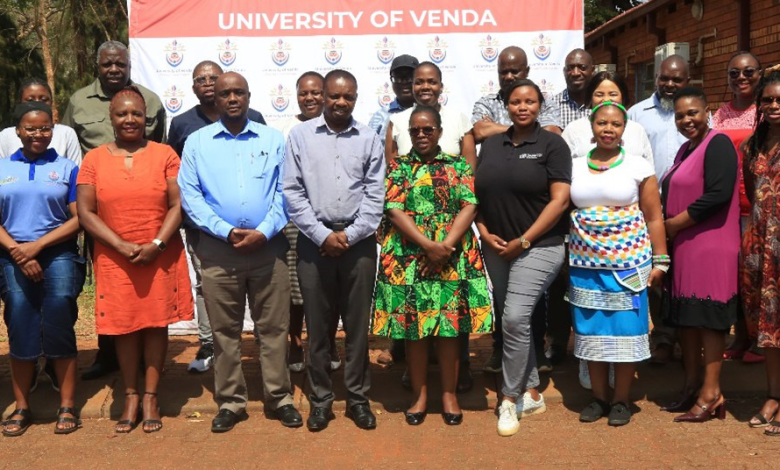Strengthening Venda’s future through UNIVEN and FAO research

The University of Venda (UNIVEN) recently launched a major two-day partnership initiative with the Food and Agriculture Organisation of the United Nations (FAO), focusing on critical research collaboration aimed at tackling global challenges. This strategic alignment, held under the theme “Advancing Resilience, Food and Nutrition Security, and Climate-Smart Innovation through Strategic Collaboration,” is designed to connect UNIVEN’s regional expertise directly with the FAO’s international development goals, ultimately securing more resilient futures for communities in the region.
Detailed list of the partnership launch
- Institutions Involved: The University of Venda (UNIVEN) and the Food and Agriculture Organisation of the United Nations (FAO).
- Event: The official launch of the UNIVEN–FAO partnership for research engagement.
- Location: Hosted at the University of Venda campus.
- Duration: A two-day collaborative event.
- Core Theme: “Advancing Resilience, Food and Nutrition Security, and Climate-Smart Innovation through Strategic Collaboration.”
- Primary Goal: To harmonise UNIVEN’s specific local and regional expertise with the broader global development priorities championed by the FAO.
- Key Focus Areas: Developing and implementing solutions related to building resilience against external shocks, enhancing food and nutritional security, and promoting climate-smart agricultural innovations within the region.
- Significance: The launch represented a major milestone in aligning local academic capacity with global efforts to address issues like climate change and hunger.
Simple summary of the story
The University of Venda recently served as the host for the inauguration of a significant two-day partnership with the Food and Agriculture Organisation of the United Nations (FAO). This alliance, titled the UNIVEN–FAO partnership for research engagement, is strategically focused on applying high-level research to solve practical, ground-level problems related to food security and environmental stability.
The core objective of the collaboration is to ensure that UNIVEN’s deep understanding of local socio-economic and environmental conditions, particularly in the Limpopo province, is directly fed into the FAO’s global frameworks. This synergy is expected to speed up the development and implementation of climate-smart innovations—techniques and technologies that allow communities to produce food more sustainably while simultaneously adapting to the unavoidable impacts of climate change, such as irregular rainfall and extreme temperatures. By formalising this relationship, both institutions are committing to pooling resources, sharing vital data, and strengthening local capacity to achieve long-term food and nutritional security for vulnerable populations. This engagement represents a critical step towards actionable science that truly benefits those working ‘from soil to solutions’, which you can read more about here: From Soil to Solutions: UNIVEN and FAO Forge Strategic Path for Resilient Futures.
Community questions and answers
- What exactly does “resilience” mean in this context?
In this context, resilience refers to the ability of local farming systems, communities, and infrastructure to anticipate, absorb, and quickly recover from shocks like severe droughts, floods, disease outbreaks, or economic downturns, ensuring that local food production and livelihoods remain stable.
- How will this partnership benefit local farmers and people in the Venda area?
The research generated through this partnership will focus on developing practical, region-specific solutions, such as new drought-resistant crop varieties, improved water harvesting techniques, or better storage methods. These innovations will be directly disseminated to local farmers and agricultural co-operatives to increase yields and make food security more reliable.
- Is the FAO going to provide funding or resources to UNIVEN?
A strategic research engagement like this often involves joint resource mobilisation, knowledge sharing, and technical support. The partnership establishes a formal mechanism for UNIVEN researchers to collaborate on and potentially secure funding for internationally recognised projects led by the FAO.
- What is “climate-smart innovation”?
This refers to agricultural practices and technologies that sustainably increase productivity and incomes, help reduce greenhouse gas emissions where possible, and, most importantly, enhance the adaptation of local farming to the changing climate conditions.
- Will this project focus on specific crops or livestock?
While the initial scope covers broad themes of food security and nutrition, the research will undoubtedly focus on crops and livestock crucial to the Limpopo province’s diet and local economy, aiming to secure traditional and staple food sources through modern, sustainable methods.
- How does this help improve nutrition, not just food quantity?
A key focus on ‘nutrition security’ means the partnership will look beyond just growing more food. They will research ways to promote the cultivation of nutrient-dense crops, improve dietary diversity, and ensure vulnerable groups (like children and women) have access to essential vitamins and minerals.
- Where can I find out about more local news stories about these types of initiatives in the area?
You can keep up to date with similar developments and community projects in the region by visiting more stories like this on the City of Thohoyandou news site, which covers local news.





